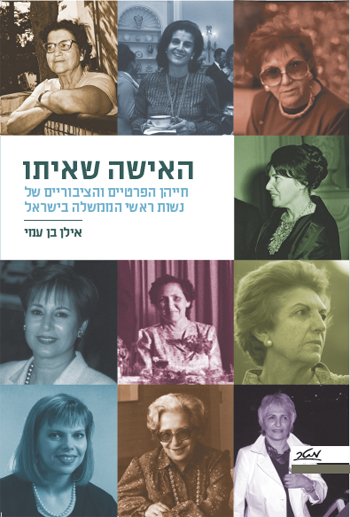Dr. Ilan Ben-Ami's New Book
Israel's First Ladies
Paula. Zippora. Miriam. Leah. Aliza. Shulamit. Sonia. Nava. Sarah. Are these names familiar to you? They will become familiar thanks to Dr.Ilan Ben Ami's new book, "Behind the Great Man: The Private and Public Lives of Israel's Prime Minister's Wives." A faculty member in the Open University's Political Science and International Relations division of the Department of Sociology, Political Science and Communication, Dr. Ben Ami has stirred up a good deal of interest in Israel with the publication of his book on the wives of Israel's Prime Ministers, a subject that has never been covered in depth before.
Ironically, Dr. Ilan Ben-Ami wrote his newest book about the wives of Israel's Prime Ministers during his sabbatical year in the United States. Perhaps it is not so ironic, since "first ladies" are a long-standing, institutionalized tradition in the United States. In Israel, not only is the subject not institutionalized, it is hardly discussed outside of the media. Nor, is there much published material.
Worthy of Our Appreciation
Dr. Ben-Ami's book sets out to correct this situation. "I wrote about these women," Dr. Ben-Ami explains, "because the public does not know who these women are, and, in most cases, they did and do influence their husbands. They were, largely, very dominant, influential women who conducted their own lives independently and are worthy of our appreciation."
Dr. Ben-Ami readily admits, that unlike the United States, where in the past century almost every American first lady has written a memoir or autobiography, there are no autobiographies of Israel's first ladies, outside of a single memoir written by Leah Rabin.
So where do you start? "Since I had neither memoirs nor autobiographies, I turned to the autobiographies of the Prime Ministers." Yet, in spite of, for example, Paula Ben Gurion's and Leah Rabin's extensive influence on their respective husbands, Paula is not mentioned in Ben Gurion's autobiography, except for a few "insignificant facts" and Leah Rabin is completely absent from Yitzhak Rabin's first autobiography.
The one exception Dr. Ben-Ami did find was Moshe Sharett, the second Prime Minister of Israel, who served from 1953-1955. Sharett's published five volume diaries mention his wife Zippora nearly every day. "He was extremely dependent on her; she was a dominant and impressive figure" Dr. Ben Ami notes, "yet this becomes diluted in the annals of Israel's history, because Sharett himself was not a dominant figure.
In addition to memoirs, Dr. Ben-Ami explored books written about Israel's Prime Ministers, only to find that here too, information about the wives was virtually absent.
However, he was able to cull a good deal of information from media and government archives (the latter carried numerous materials on the first three ladies: Paula Ben Gurion, Zippora Sharett and Miriam Eshkol.) He also found materials at the Begin, Rabin and Sharett Centers.
But, the most helpful information came from individual interviews. Dr. Ilan Ben-Ami interviewed Aliza Olmert and Nava Barak, had a one hour phone conversation with Miriam Eshkol, who spent almost the entire time telling Dr. Ben Ami, "why she wouldn't give [him] an interview." Shulamit Shamir had to cancel her interview with Dr. Ben Ami when she was hospitalized, but willingly provided a lengthy written response to his questions. The fiercely private Sonia Peres not only refused to be interviewed, but forbade her daughter from speaking with Dr. Ben-Ami. In a number of cases, Dr. Ben-Ami interviewed the children of the Prime Ministers and the wives' personal assistants.
What Constitutes Influence?
All the women had some influence on their husbands, but influence, as Dr. Ben-Ami points out, "is a tricky word since we don't really know what happens at the breakfast table or in the privacy of their bedrooms."
One of the most interesting cases of strong influential political sway is the case of Aliza Olmert. Ehud Olmert readily admits that it was the work of Aliza, who possesses strong left wing views, who helped direct his political thinking as Prime Minister. On the other hand, Aliza Begin unsuccessfully tried to sway her husband during the Camp David negotiations, urging him to stay the line, when they would talk late into the night by phone after his meetings. There are dozens of other instances throughout the 284 page book which Dr. Ilan Ben-Ami describes in great detail.
The book has been very well received, but the universal rejoinder echoed throughout Israel's corridors in response to the book has been, "Extraordinary, I didn't know that."
|

